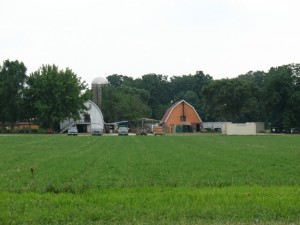
This past Sunday, July 10th, students in my PLS 392 Seminar in Humanities online summer course at Roosevelt University took an “agricultural landscapes” field trip to north-central Illinois, near the city of Rockford and just south of the Illinois-Wisconsin border. Such an adventure might seem an odd outing for a class like ours, which focuses on “representations of the urban landscape.” However, as the environmental historian William Cronon argues in his prologue to Nature’s Metropolis (1991), the city and country exist in a symbiotic relation, one defining the other in a dance of mutual dependence. And given the continued importance of farming in the otherwise heavily urbanized six-county Chicago region, we found it appropriate to explore northeastern Illinois’ remaining agricultural lands and to think about the shape and character of these lands and their relation to the city.
Enter Angelic Organics Farm, an organic community supported agriculture (CSA) operation based in Caledonia, IL. Angelic Organics was founded in the early 1990s by John Peterson, whose family had farmed this land since purchasing it in the Great Depression of the 1930s.
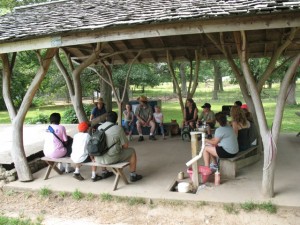
Peterson’s colorful history as a soul-searching farmer, writer, performance artist, and philosopher is the subject of the fascinating 2006 documentary film, The Real Dirt on Farmer John. The Angelic Organics Learning Center provides public tours and a wide variety of educational programs to teach visitors the craft of sustainable agricultural and its vital connection to the stewardship of nature. This farm is a living classroom where visitors observe how local diverse agricultural traditions thrive in our age of mega-industrial monocultural croplands and large-scale animal confinement operations.
Our tour guide on Sunday was April, an instructor at the Learning Center with a background in outdoor education and natural history. She led us on a two-hour walk around the grounds of the 180+ acre site and introduced us to the methods of vegetable production as well as animal husbandry employed on this diversified farm. Along the way, her narrative gave us a sense of how the ideas and philosophy behind such a farm are as important as the technical knowledge and hard physical labor that keep it going.

While there was only minimal active work being done on the farm that day (mostly the daily tending of animals), we did get a chance to inspect the many acres of vegetable fields up close and personal; pick some beets and basil; take home a broccoli flat or two; see the newborn baby bull frolic with his mother in a bucolic pasture; and hang out with the goats and chickens in their pens.
What one takes away from such an extraordinary opportunity to tour a working organic farm depends upon, in part, one’s background and connection to agriculture. Those in our group ranged from city folk like me with little to no experience working or living on farms, to those who grew up on farms or visited them frequently as children. For several people in our class, this represented their first time ever setting foot on a working farm. In that context, the opportunity to see where food comes from — what it looks like and how it’s grown in the fields — is a remarkably eye-opening experience.

For those familiar with conventional agriculture in the Midwest, the seemingly unending fields of corn and soybeans destined to be processed into a myriad of industrial agricultural products (from corn syrup to ethanol to animal feed), Angelic Organics is a throw-back to an earlier age when farms were diverse. And for those who garden small plots in their yards, the long orderly rows of perfectly cultivated vegetables — kale, lettuce, fennel, garlic, onions, tomatoes, potatoes, sweet corn, beets, and much more –represent a staggering achievement of scale using labor-intensive growing methods.
In such a neo-traditional model, dozens of different vegetables are grown in a well-orchestrated crop rotation in which fields are rested two out of every four years so that the soil is replenished; different types of crops are planted on a given plot of land, so as to avoid excessive nutrient depletion; animal waste is composted and used to fertilize the soil; hand labor and the intelligent use of technology is used to mitigate against pests and avoid the use of chemicals in protecting plants.
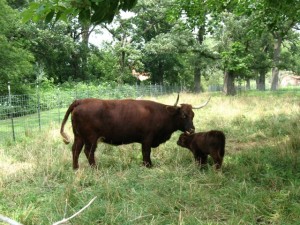
I say “neo-traditional” because while Angelic Organics, as the largest CSA farm in the Midwest, is at the cutting edge of contemporary farming, it also is a throwback to the time before World War Two when most American farms were family-run, highly diversified operations that used animals to produce eggs, cheese, milk, and meat; rotated crops and pastureland to maintain soil fertility; and recycled key elements of the farm — grass and manure — in a closed-loop ecosystem.
Angelic Organics, like other CSA operations, is a great place to contemplate the connection of farm to city. The idea of a CSA — where citizens purchase shares in a farm in advance of the growing season in order to help finance the farm’s operation, then receive a weekly box of harvested produce throughout the summer and/or fall — is a method of food production in which the farmer sells directly to the consumer and the purchaser feels an economic, social, and even physical connection to the farm.
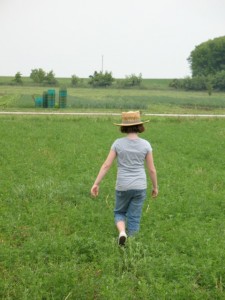
This sort of social contract is a strong element of Angelic Organics’ method and identity, and it connects this part of rural Illinois to urban residents in Rockford, Chicago, Schaumburg, and several other urban and suburban communities where the farm delivers its CSA share boxes to customers.
Another means of connection is the farm itself, which has developed its own education and public outreach programs through the Angelic Organics Learning Center. Here people can travel from cities, suburbs, and small towns to see a working Illinois organic farm in action, where all its operations are visible to the public and various kinds of skills and traditions (making soap, baking bread, tending animals) are taught in family-oriented programs. CSA members can also come to the farm and pick their own produce, a privilege that encourages them to think of the place as “their farm” — something they have ownership of in a very literal way.
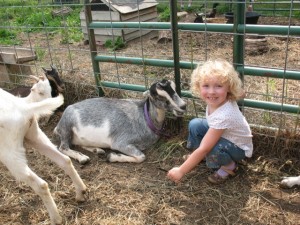
This kind of welcoming attitude which defines many small-scale CSA farms stands in stark contrast to the industrial mega-farms and confined animal feeding operations (CAFOs) that bar visitors, reporters, and cameras from their premises — a common practice depicted in recent agricultural documentaries such as Food, Inc.
For our group from Roosevelt University, the visit to the Angelic Organics Learning Center was a transformative experience. Students gained a much deeper appreciation of the work, planning, and creativity that go into a sustainable farm operation; and we were impressed by the aesthetics of the farmland and the sense of place it engenders within the rural landscape. A few students brought their children, as I did, and they were excited to learn about the crops and animals. Future Roosevelt field trips to this agricultural haven are definitely in the works!
What a wonder trip,the girls are so lucky.
Since mega-industrial agriculture and CAFOs are both environmentally devastating and heavily oil-dependent, their days are numbered. They are still the dominant means of food production at the moment. Farms like this are keeping alive the skills and knowledge that will backfill the void that collapsing industrial agriculture is going leave behind. Students will benefit tremendously from knowing how food is produced now and how it should be produced (on farms like this one). One can predict a burgeoning small-farm economy, with an expansion of jobs, in the near future, although this is utterly invisible to the power structures that control things at the moment. It can’t come too soon!
Agreed, Karl. And the government-sponsored industrial-ag complex is still a juggernaut, these progressive farm endeavors in IL by Angelic Organics and others — the urban farms throughout Chicago run by folks such as Growing Power, Henry’s Farm (veggies and herbs) and Wettstein’s Organic Farm (meats and eggs) in Central IL’s Woodford County, Wind Oaks Farm (veggies, herbs, mushrooms) in my own Will County — are challenging the monocultural-chemical mindset. These kinds of farms and ag issues are addressed in our Sustainability Studies 230 Food course at Roosevelt. (It’s not surprising, either, that it’s already one of the fledgling department’s most popular courses. People really want to learn about where their food comes from.)
One of the great challenges, and golden opportunities, is to use our educational system to promote change and build a new paradigm of farming expertise based on the innovations of sustainable farmers. I’d like to see some of Illinois’ storied ag programs take on that challenge with gusto and creativity, starting in my hometown with Joliet Junior College’s well-established ag program.
Great tribute to the farm, Michael! I hope to meet you in person some day. Best, Farmer John
Thanks, Farmer John. Much obliged for the good word, and I second the motion. Looking forward to bringing my family back up to your farm soon. We live a bit far away (Will County) but definitely will be back.
I belong to a CSA about 4 miles from my house, and we get two bins of veggies every Tuesday. I like the challenge of figuring out meals based on whatever veggies are in the bins that week. And I love having a chance each week to talk to the folks who are growing my food.
You’re making me hungry, jo(e). Send me two or three of your recipes; my cooking is in a rut. But I did sauteé some beet greens on the 4th of July weekend, and they were mighty tasty.
What a wonderful description of the farm and your adventures there! I wish we wouldn’t have been out-of-town so we could have helped show you around, but I know you got a wonderful tour with April.
I love the picture of the two Esmes!
I hope to help out on your returns to the farm!
Jessie, my expectations of the tour were high, to say the least. But they were easily exceeded by the experience, especially in light of the beautiful landscape cultivated at the farm, and the profound impact the tour had on my students. We will definitely arrange this is the future so you can be our guide. Look forward to it!